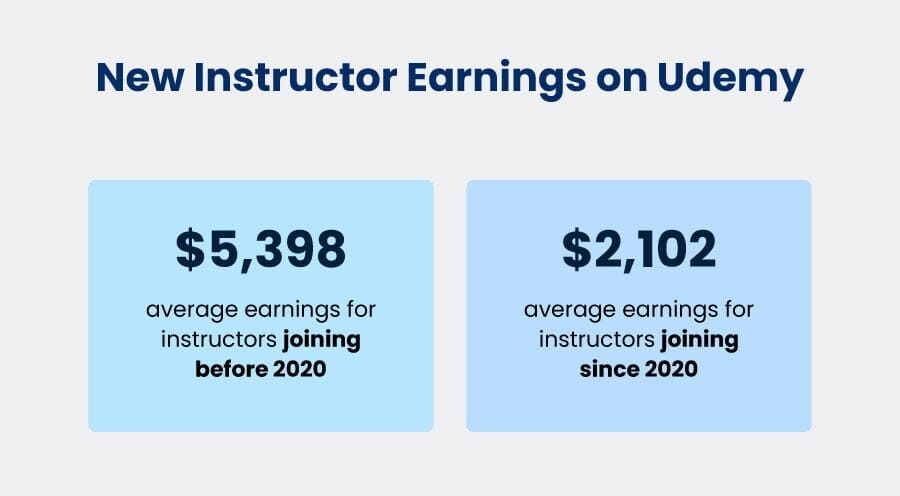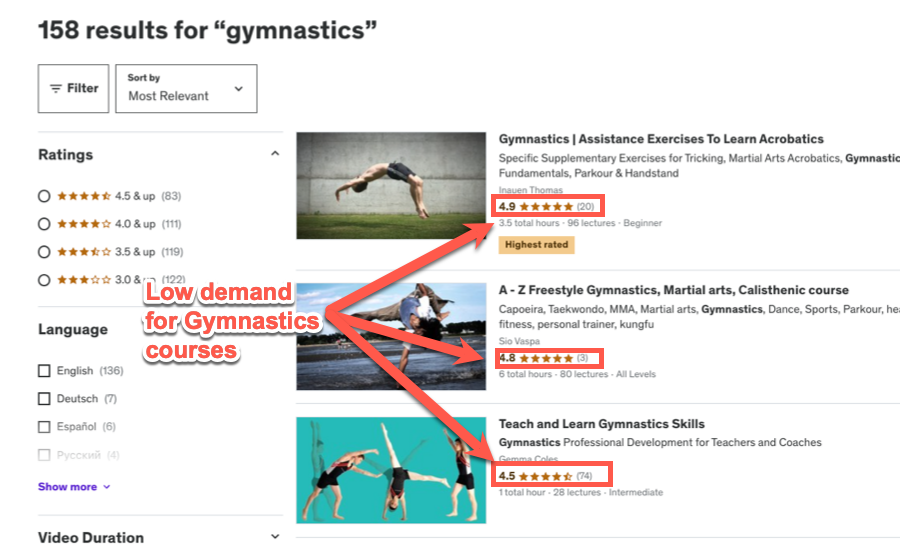We earn a commission from partner links on this site. This doesn’t affect our opinions or evaluations.
As the leading digital education marketplace available today, Udemy presents an option that numerous instructors contemplate for distributing their digital training programs.
Nevertheless, this choice is certainly not a simple one to arrive at. Although distinct advantages exist for offering educational content via Udemy, several significant disadvantages are present too.
Actually, you can encounter numerous varied viewpoints online concerning this subject, with many published pieces adopting a firm stance for or against without offering an equitable discussion.
Having previously offered courses through Udemy, we possess firsthand knowledge regarding its benefits and limitations. This examination of Udemy intends to assist your determination of “Is Udemy Advantageous?” by outlining the positive and negative aspects associated with offering courses on their system.
Let us begin.
Udemy stands as the globe’s most extensive educational marketplace, featuring a comprehensive catalog of digital courses and serving innumerable registered learners.
Functioning as a central hub, it provides instructors more than a system for delivering content and processing transactions; it additionally presents an established user base and assists in vigorously promoting their educational materials.

Anyone can teach a course on Udemy
Thanks to its substantial learner population, a multitude of educators have established thriving professional paths by offering digital courses through Udemy.
To illustrate, educators such as Phil Ebiner and Rob Percival have achieved substantial seven-figure earnings as instructors on this platform, alongside hundreds of other creators generating six-figure incomes or greater.
As an instructor, you possess the ability to deploy an unlimited number of complimentary or premium courses onto the platform without incurring any mandatory fixed recurring charges, positioning it among the leading complimentary course creation tools.
Concerning its operational structure, the Udemy marketplace functions by retaining a portion of your course earnings whenever an individual makes a purchase.
The earnings percentage you receive as an educator is contingent upon the method through which learners find your course, fluctuating between 37% and 97%:
Beyond the aforementioned points, you are also obligated to remit a 30% charge to Google or Apple should a learner purchase your course via Udemy’s mobile application.
Udemy features a distinct initiative named Udemy Business, granting corporations and institutions access to its course offerings. Participation, however, is restricted to specific courses meeting their quality benchmarks, possessing favorable reviews, and covering pertinent subject matter.
Udemy Business utilizes a subscription fee arrangement, wherein 20% of the total revenue is allocated to the collective instructor earnings pool. Specific instructors subsequently receive payments calculated from their proportion of the aggregate minutes viewed by corporate users monthly.

Udemy
Gradually, Udemy Business has emerged as a substantially more critical segment of the platform, making up close to 60% of Udemy’s income during 2023, and its growth is forecasted to continue subsequently.
Therefore, Udemy has steadily redirected its emphasis away from operating solely as an individual learner educational environment to increasingly accommodating organizational and enterprise clientele, which alters the landscape for marketing courses on the system.
Several compelling factors explain why Udemy proves effective for numerous digital instructors and why it could potentially be advantageous for you as well. Consequently, let’s delve into all the points that support offering educational programs on Udemy.
Udemy’s primary attraction for incoming educators lies in granting them entry into a vibrant, pre-existing collective of learners already using the site.
Annually, substantial numbers of learners join the Udemy ecosystem, establishing profiles and linking payment methods, prepared for future course acquisitions readily available.
This marketplace accommodates above 70 million learners globally, absorbing knowledge from a pool exceeding 75,000 diverse educators worldwide.

Udemy Stats at a glance
This platform maintains significant brand awareness among digital learners; moreover, it actively markets your programs using paid advertising campaigns and countless associated marketers.
Numerous instructors possess outstanding teaching abilities for online programs but struggle with the marketing and sales aspects of their courses. Consequently, if you identify with this profile, Udemy offers a suitable environment to begin with diminished marketing demands.
An additional aspect we appreciate regarding Udemy is its status as the swiftest method for beginning online course sales. There’s no requirement for establishing a personal website, and as previously mentioned, the marketing aspect demands considerably less effort.
Udemy additionally manages your tax obligations and oversees various enhancements designed to boost your financial results as an instructor creating content.
As an example, it performs consistent enhancements aimed at boosting sales conversions and perpetually evaluates innovative elements such as varied pricing structures for identical courses across distinct regions.
Furthermore, your primary objective might simply involve gathering preliminary reactions to your educational program and pinpointing opportunities for refinement later on.
Alternatively, perhaps you find yourself undecided and wish to conduct a brief trial project to determine whether dedicating more resources to your digital course venture is worthwhile or not.
In any of these scenarios, Udemy can function as a perfect preliminary environment prior to committing to your own dedicated course platform.
Despite utilizing a marketplace platform such as Udemy for sales, numerous elements require clarification prior to your course being prepared for its debut.
However, Udemy simplifies this considerably by providing a wealth of valuable assistance materials, guiding you step-by-step throughout the whole journey of creating and marketing your initial digital course.
Consequently, you gain entry to a well-structured repository of articles and guides, addressing subjects including:
Beyond these resources, you are granted admission to an energetic instructor collective where posing inquiries and sharing insights with fellow creators is possible. This also serves quite effectively as a source of motivation for novice educators.
Udemy further presents a complimentary utility known as Marketplace Insights to assist you in collecting information and understanding the earning prospects associated with potential new course subjects.

Udemy’s Marketplace Insights Tool
At its heart, Udemy excels by offering a remarkably simple starting point for aspiring educators, which greatly assists the platform in continually attracting promising new instructional talent.
The quality of the educational journey students undertake is fundamentally linked to sustained business expansion and the personal fulfillment derived by educators, and Udemy truly excels in delivering on this front.
The platform’s interface designed for student learning is both polished and intuitively easy to navigate, and it’s certainly advantageous that a significant portion of Udemy’s student base consists of returning individuals already acquainted with its operational flow.
Furthermore, the platform enforces essential quality benchmarks concerning the video and audio materials that instructors are permitted to release.

Udemy’s Video Standards
Regarding educational resources, Udemy provides a variety of instruments enabling instructors to assign tasks, administer quizzes, offer practice examinations, and include specialized activities pertinent to certain fields, such as coding drills.
To encourage communication connecting educators and learners, the platform incorporates a direct messaging feature, and learners also have the opportunity to engage with one another through an integrated question-and-answer forum accessible right on the site.
An additional aspect we appreciate concerning Udemy is its provision for mobile learning accessibility via its dedicated application. This app further permits the downloading of course materials for viewing without an internet connection, and users can stream course lectures using technologies like Chromecast or Apple TV.
Nevertheless, it’s important to note that delivering a superior educational environment isn’t solely confined to Udemy; it’s entirely possible to provide an exceptional learning journey using platforms designed for course development which don’t operate as traditional marketplaces.
Up to this point, our discussion has centered on the advantages associated with distributing online courses through Udemy; however, there exist various potential drawbacks when establishing your online course enterprise on this platform, which we will explore subsequently.
You can find numerous resources online detailing potential reasons to avoid selling educational programs on Udemy. In the following sections, we will present our perspective on this topic, informed by both our firsthand knowledge and the insights shared by clients who have chosen to migrate their courses away from Udemy’s ecosystem.
The most significant disadvantage associated with offering courses via Udemy is the absence of direct ownership over the connection you have with your clientele, specifically, your learners in this context.
While the Udemy system permits communication with your students via email channels provided by the platform, it crucially restricts your access to their actual email contact information. Consequently, cultivating a truly authentic rapport with your student base becomes quite challenging.
As an educational entrepreneur, your objective typically involves nurturing a dedicated following, constructing a structured approach for introducing additional offerings, and motivating your most enthusiastic learners to advocate for your brand across various social platforms.

Regrettably, executing any of these crucial strategies becomes impracticable if your educational programs are offered via Udemy, precisely because you are not granted ownership of the direct link to your learners.
Moreover, lacking direct control over student information implies that you aren’t merely overlooking potential revenue streams, but it concurrently elevates the level of vulnerability for your enterprise. Should circumstances arise preventing you from distributing courses through Udemy down the line, this situation could conceivably signify the termination of your entire business venture.
Consider the experience of Jerry Banfield, an instructor who faced removal from the Udemy platform subsequent to having successfully delivered courses to an audience exceeding 140,000 learners.
A further significant disadvantage when establishing your educational enterprise through Udemy relates to the platform’s ability to modify its operational guidelines whenever it chooses, leaving instructors with essentially no alternative course of action.
Consequently, should Udemy elect to alter elements such as instructor revenue distribution or the approach to setting course fees in the future, such a development should not come as unexpected. Lest you consider this merely a hypothetical concern, remember that Udemy has enacted such modifications on multiple occasions previously:
As an illustration, Udemy decreased the portion of revenue allocated to instructors, lowering it from 70% down to 50% back in 2013, and subsequently reducing it further from 50% to 37% during 2021. Indeed, there was a period when the educator’s share stood at 90%.
On a separate occasion, the platform implemented a regulation that restricted courses featured within the Udemy Business collection from being offered concurrently on alternative educational websites.
Furthermore, Udemy exercises ultimate authority regarding the pricing structure applied to your educational offerings. This pricing has exhibited a persistent downward trajectory over time, with courses currently available for purchase at remarkably low figures, such as $4, within specific geographical markets.
In earlier times, generating initial sales through Udemy was comparatively straightforward, yet the platform has now become significantly more challenging than previously. You’ll find over 75,000 educators present, collectively offering upwards of 220,000 distinct courses.
Because of this saturation, it has grown exceptionally tough for incoming instructors to secure adequate visibility and successfully attract student enrollment. Furthermore, Udemy’s search mechanism tends to give considerable preference to popular courses that have accumulated positive ratings, which compounds the difficulty for new educators attempting to establish a foothold.
Selling Online Courses Guide undertook an analysis concerning Udemy instructor compensation in 2025 and discovered that the average annual earnings for instructors who began after 2020 amount to merely $2,100 per year, contrasting sharply with the $5,400 annually earned by educators who joined the platform prior to 2020.

New instructor earnings on Udemy
Additionally, three-quarters of educators utilizing Udemy generate less than $1,000 per annum via the platform, contrasted with a mere 1% who manage to earn over $50,000 yearly.
These numerical insights underscore the intense degree of competition that now characterizes the platform, thereby rendering the task of achieving a satisfactory income derived solely from Udemy considerably more challenging.
An additional hurdle when utilizing Udemy is that unless your expertise lies within highly sought-after subjects such as programming, website creation, or project management, the potential student interest might simply fall short of what’s needed.
Constructing a viable enterprise on Udemy typically hinges on achieving substantial enrollment figures; however, this particular business strategy is fundamentally impractical if you are offering courses within a specialized field (for example, Gymnastics) that lacks significant demand among the platform’s user base.

Demand for Gymnastics courses on Udemy
Furthermore, the Udemy Business segment accounts for approximately 60% of total platform revenue, with projections indicating this figure will surpass 75% over the extended period.
This signifies that the prospective income generation for educational programs outside of technology and business fields is comparatively diminished on this platform.
Consequently, it is crucial for educators to meticulously evaluate their chosen course subject matter and intended learner demographic when developing content for Udemy.
Should your area of expertise fall within a specialized market segment, the sole viable path to establishing an online educational venture involves creating your own dedicated website, cultivating a specific following, and commanding a higher fee for your offerings.
For a clearer comprehension of the distinctions between offering courses through Udemy versus managing your independent platform, we recommend reviewing this Udemy vs Teachable guide.
Throughout this detailed Udemy assessment, we have extensively examined the platform’s operational framework, along with the benefits and drawbacks associated with distributing courses through it. Deciding whether or not utilizing Udemy for your course sales is appropriate will largely be determined by your personal aims and the specific category your course occupies.
Should you be aiming to dip your toes into the waters of course development or seeking preliminary insights and reactions, offering your courses on Udemy might prove to be a suitable strategy.
Conversely, if your aspiration is to cultivate a reliable, sustainable online educational venture, developing a dedicated audience and establishing a recognizable brand are essential. In such a scenario, it would be advisable to launch your own distinct online learning institution and direct your energies towards achieving that goal.
An additional factor demanding careful consideration is the specific niche your course caters to. If your educational material resides within a non-technical or non-business-oriented field, Udemy could potentially be a practical choice for you as a course provider.
In conclusion, we strongly caution against ever viewing Udemy as your fundamental source of income, regardless of your enterprise’s particular specialty or current stage of growth.
We sincerely hope this Udemy evaluation has been beneficial and has provided a clear answer to the question, “Is Udemy a valuable platform for selling courses?” Should you possess any further questions, we encourage you to post them in the comments section below.
Anyone can teach on Udemy given that your course doesn’t teach one of the restricted topics. Plus, if your course is free, you won’t need any approval. Otherwise, you’ll need to apply to become a premium instructor.
The course creator retains ownership of the content on Udemy. They can list the same course on other platforms including their own website and they can remove it from the marketplace whenever they want. The only exception is when a course is included in Udemy business, you can’t sell it on another learning platform.
Udemy charges 63% commission on all regular course sales, while it takes just 3% when a course is sold through instructor coupons or referral links. In the case of Udemy Business, Udemy retains 80% of the revenue.
Udemy Business works very differently from Udemy’s marketplace model. It is a subscription-based program and course creators are paid based on the total number of minutes students consume within your courses.
The average instructor earning on Udemy is $3,306 per year. However, the distribution of income is not equal. The majority of instructors (75%) make less than $1,000 a year, while only 1% make a full-time income ($50K+/year).
Yes, there’s a lot of competition on Udemy. Over 75,000 instructors teach more than 220K courses, while the earnings for the majority are insignificant. 75% of instructors earn less than $1K/year, and average earnings for those who joined since 2020 have dropped to $2.1K/year from $5.4K/year for those who joined before 2020.

Daniel NicFounder, SellingOnliceCoursesGuide.comis an entrepreneur and digital education specialist who founded sellingonlinecoursesguide.com, a platform dedicated to helping creators and educators successfully navigate the online course marketplace. Through his website, he shares insights and strategies for developing, marketing, and monetizing online educational content. His work focuses on empowering course creators to build sustainable online businesses while effectively sharing their knowledge with students worldwide.

Daniel Nic is an entrepreneur and digital education specialist who founded sellingonlinecoursesguide.com, a platform dedicated to helping creators and educators successfully navigate the online course marketplace. Through his website, he shares insights and strategies for developing, marketing, and monetizing online educational content. His work focuses on empowering course creators to build sustainable online businesses while effectively sharing their knowledge with students worldwide.

We respect your privacy and will never spam you.